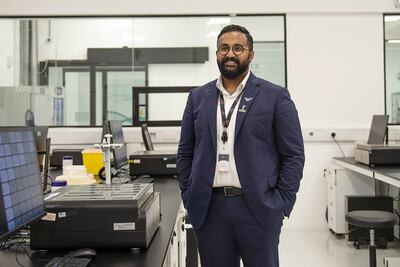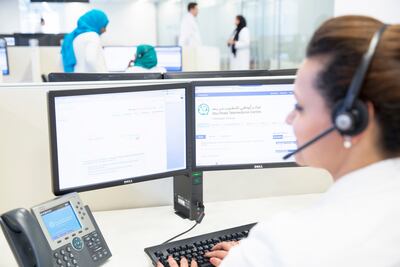In several spots across the UAE, massive white tents, where thousands of PCR tests were performed each day, have begun to disappear. In Sharjah, in the northern Emirates, suhoor tents have gone up in their place, a return to normality during Ramadan, for the first time since 2019.
Tents going up and tents going down — this is the sign of a pandemic turning endemic in a country that has dealt with a global health crisis with limited disruption to daily life since recording its first Covid-19 case on January 29, 2020.
G42 Healthcare
The UAE's strong performance during the pandemic was not a foregone conclusion: healthcare costs were on the rise when Covid-19 took hold and the country had a shortage of nurses relative to Western nations, according to analysis by the US-UAE Business Council in 2021.
Yet on Bloomberg's monthly global Covid-19 resilience ranking the UAE regularly sits in the top three, thanks to a huge vaccination effort and limited interference in travel and economic activity. And while other mega-events such as the Beijing Winter Olympics and Tokyo Summer Games struggled to balance effective restrictions with spectacle, Expo 2020 Dubai recorded more than 24 million visits in its six months, with one in three visitors coming from overseas.
In Abu Dhabi, leaders in healthcare, emboldened by the experience of managing Covid-19, are now thinking about what comes next.
“The whole dynamic is changing,” said Dr Hamed Al Hashemi, digital health lead and adviser to the chairman of the Department of Health, the healthcare regulator in the emirate. He spoke exclusively to The National alongside Ashish Koshy, chief executive of G42 Healthcare, a health technology company and subsidiary of artificial intelligence firm Group 42, and a partner in Abu Dhabi's pandemic response.
Today, Abu Dhabi has ambitions to capture the world's first population-wide genetic library, pioneer connected health and build on previous collaborations with pharmaceutical giants Pfizer and AstraZeneca in medical research.
Collecting data for the Emirati Genome Programme
Three months before the pandemic began, the DOH launched the Emirati Genome Programme, a national project aimed at capturing the genomic data of every Emirati in the country, a first-of-its-kind effort to give citizens access to their own personal genome and to incorporate this data into healthcare management.
The project took a back seat to Covid-19 but Mr Koshy said it is now in overdrive, with plans to hire as many as 200 new lab technicians, cloud engineers and artificial intelligence experts, among others, this year to its campus in Masdar City. G42 Healthcare's Omics Centre of Excellence is set up to manage DNA samples, sequence the genetic information and store the data.

The genetics lab aims to screen the entire Emirati population of one million within months. Then, “it is a matter of when not if” the project extends to the UAE's expatriate population of roughly 8.8 million, according to Mr Koshy.
The implications of capturing a population-wide data set of entire human genomic sequences with the diversity of the UAE would be massive for testing drug efficacy and disease prevention.
With sample collection under way, the next step will be deciding who gets access to the data sets and what projects to prioritise among universities, local authorities and larger multinationals, Mr Koshy said.
“We are all taking drugs that have been definitely tested on a Caucasian population, and we're just assuming it works for us. What we're trying to solve is potentially working with pharmaceutical companies like AstraZeneca, or Pfizer to bring them into Abu Dhabi, leverage this data set that works on a diverse population, and create something that works for all,” Mr Koshy said.
The centre can also be used to capture and analyse genomic sequences that are not human. Mr Koshy said eventually G42 Healthcare will turn its attention to food security and use the Omics centre to find traits in plants that can boost yields and survive threats such as drought and pests.
‘The doorway to personalised medicine’
But for now, let's stick with humans. The genome project is a big plank in Abu Dhabi's ambitious plans for personalised medicine, which also include a connected network of the emirate's medical records.
Personalised medicine is a term coined around the turn of the century, when the potential of wide-scale genetic sequencing became apparent to scientists and a “one-size-fits-all” approach to health care was called into question. Suddenly, access to an individual's genetic make-up made it possible for the medical industry to diagnose, treat and prevent disease based on a person's biomarkers, which can tell how well they might respond to a medical intervention.
Today, personalised medicine is seen by many as a gateway to “overcoming the limitations of traditional medicine”, as it was put by US genomics research lab The Jackson Laboratory. For now, it remains a nascent industry but billions are being poured into research and development.
Abu Dhabi, for its part, is putting the building blocks into place.
In August 2018, the DOH teamed up with Injazat Data Systems, owned by Mubadala Investment Company, to develop a health data exchange system for the healthcare sector in Abu Dhabi. The resulting system, known as Malaffi and launched in January 2019, enables a real-time exchange of patient health information between healthcare providers with the aim of improving patient outcomes. It is the system that, for example, connected a PCR test taken at Cleveland Clinic Abu Dhabi to Al Hosn app.
As of April 2021, 95 per cent of all hospitals in Abu Dhabi were connected to Malaffi.
“If you have data, we better use it for saving lives or improving the efficiency of the system,” Dr Al Hashemi said of the department's philosophy on data collection.
DOH is now working to take Malaffi a level up — so far it has used the data available on the system to develop predictive algorithms for 14 different diseases, providing an early warning system to physicians if a patient is predisposed to a condition.
“So the physician, instead of only checking the lab record, or the previous episodes, actually can have a better insight with a predictive analysis for that person,” Dr Al Hashemi said.
He said clinical data will eventually be integrated with the genomics project.
And it is this milestone that will mark “the doorway to personalised medicine”, according to Mr Koshy.
Beyond telehealth
While doctor's visits that take place on a laptop are common in the UAE these days, telemedicine is ready to go a step further.
“The current industry trends suggest patients suffering from chronic diseases that require routine hospital visits are now being encouraged to stay at home and consult doctors and monitor symptoms with the help of technology,” Mr Koshy said. “Telemedicine and wearables work hand in hand … It gives you the key early warning system of our bodies.”

Continuous patient monitoring through wearable devices is a move towards a more hybrid model of care, combining in-person and telehealth that Dr Al Hashemy said is being applied to some patients, but is not quite at the stage where it is ready to be heavily used.
“We're meeting technology companies every month that want to participate in this area,” he said. “It's time to extend the elements of telehealth.”
Dr Al Hashemy and Mr Koshy are excited about the prospects of all of this patient data, especially when it comes to making Abu Dhabi a destination of choice for clinical trials and collaborative healthcare research.
Last year, G42 Healthcare launched Insights Research Organisation and Solutions, a first-of-its-kind contract research organisation in the UAE to support internationally leading standards of scientific and ethical research, conduct clinical trials and report and develop treatments. The company was started following the success of the country’s Phase III clinical trials for the development and testing of a Covid-19 vaccine, where 130 nationalities participated.
“That is something we are uber-proud of,” Mr Koshy said. “It was the most diverse clinical trial. And I think that is exactly what pharma companies want — to come in and look into: how do we get access to a diverse population under one single roof".
The DOH and G42 Healthcare are saying now, and in the future: look no further than Abu Dhabi.












